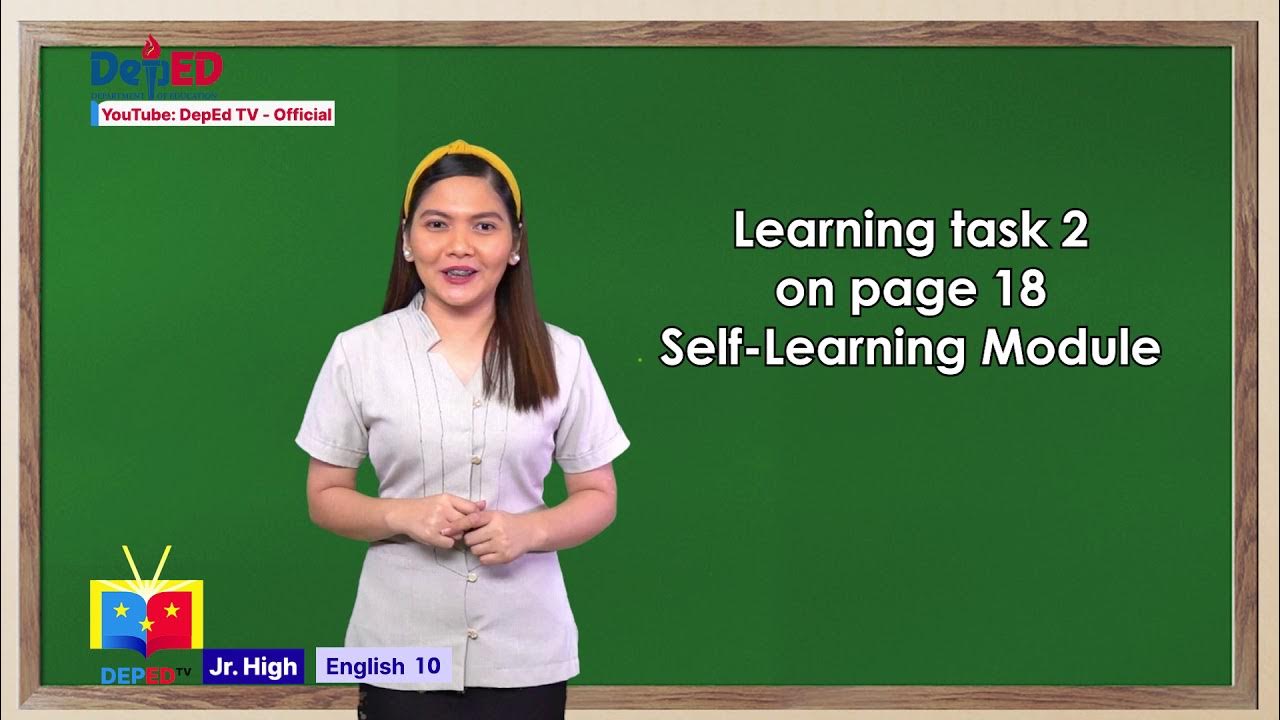ENGLISH 9: CONDITIONALS
Summary
TLDRIn this educational video, Teacher Ellen Jane Sierra Gaza from Hawaiian City National High School guides Grade 9 students through English conditionals, explaining their structures and uses. She covers zero, first, second, and third conditionals, illustrating each with examples and activities. The session explores real and hypothetical situations, helping students understand how to express abilities, possibilities, and obligations clearly. The lesson concludes with a quiz to reinforce learning, emphasizing the importance of daydreaming as a creative outlet during quarantine.
Takeaways
- 📚 The lesson is focused on understanding and using modal verbs and conditionals in English.
- 🗣️ Teacher Ellen Jane Sierra Gaza from Hawaiian City National High School is the instructor for this learning session.
- 🔄 Modal verbs express different concepts such as ability (can, could), possibility (may, might), permission (may, can, could, will, would), and obligation (must, have to).
- 🚫 'Mustn't' is used to express prohibition.
- 🌌 Daydreaming is described as a series of pleasant thoughts about preferable activities or future achievements, which can be real or imaginary.
- ✈️ Daydreams may include unrealistic scenarios like flying to the moon or meeting celebrities.
- 🔢 Conditionals are categorized into four types: Zero, First, Second, and Third, each with a specific structure and use case.
- 🌐 Zero conditionals describe universal truths and habits, using 'if' or 'when' followed by present simple tense in both clauses.
- 🔮 First conditionals are used for predictions, plans, and possible future outcomes, structured as 'if' or 'when' plus present simple, then 'will' or 'going to' plus verb.
- 🤔 Second conditionals are for hypothetical and unlikely situations, following the 'if' plus simple past, 'would' plus verb structure.
- 🏆 Third conditionals reflect on past unreal situations and their consequences, using 'if' plus past perfect, 'would have' plus past participle.
- 📝 The lesson includes an activity where students construct sentences based on pictures using the four types of conditionals.
- 📉 A quiz is provided at the end of the lesson to test students' understanding of the conditionals covered.
- 🌟 The benefits of daydreaming are mentioned, such as stress relief and problem-solving, but it's advised to do it in moderation.
Q & A
What is the main topic of the video script?
-The main topic of the video script is the explanation and use of conditionals in English, including zero, first, second, and third conditionals.
Who is the speaker in the script?
-The speaker in the script is Teacher Ellen Jane Sierra Gaza from Hawaiian City National High School.
What are modal verbs used to express in sentences?
-Modal verbs are used to express ability, possibility, prohibition, permission, and obligation in sentences.
Which modal verbs are used to express ability according to the script?
-The modal verbs used to express ability are 'can' and 'could'.
What is the structure of a zero conditional sentence?
-The structure of a zero conditional sentence is 'if or when' plus present simple, plus present simple.
What does the first conditional express?
-The first conditional expresses predictions, plans, offers, promises, suggestions, and warnings about possible future outcomes.
What is the difference between 'if' and 'when' in conditional sentences?
-The difference between 'if' and 'when' is that 'if' is used when there is a chance that the action might happen, while 'when' is used when the action is certain to happen.
What is the structure of a second conditional sentence?
-The structure of a second conditional sentence is 'if' plus simple past, 'would' plus verb.
What does the third conditional express?
-The third conditional is used to express hypothetical or unreal situations in the past and their imagined past consequences.
What is the purpose of the activity involving pictures in the script?
-The purpose of the activity involving pictures is to practice constructing sentences using the four types of conditionals based on the images provided.
What is the final advice given by the teacher regarding daydreaming?
-The final advice is that daydreaming is okay and has benefits such as reducing stress and helping problem-solving, but it should be done in moderation as excess of anything is not good.
Outlines

Dieser Bereich ist nur für Premium-Benutzer verfügbar. Bitte führen Sie ein Upgrade durch, um auf diesen Abschnitt zuzugreifen.
Upgrade durchführenMindmap

Dieser Bereich ist nur für Premium-Benutzer verfügbar. Bitte führen Sie ein Upgrade durch, um auf diesen Abschnitt zuzugreifen.
Upgrade durchführenKeywords

Dieser Bereich ist nur für Premium-Benutzer verfügbar. Bitte führen Sie ein Upgrade durch, um auf diesen Abschnitt zuzugreifen.
Upgrade durchführenHighlights

Dieser Bereich ist nur für Premium-Benutzer verfügbar. Bitte führen Sie ein Upgrade durch, um auf diesen Abschnitt zuzugreifen.
Upgrade durchführenTranscripts

Dieser Bereich ist nur für Premium-Benutzer verfügbar. Bitte führen Sie ein Upgrade durch, um auf diesen Abschnitt zuzugreifen.
Upgrade durchführenWeitere ähnliche Videos ansehen

Unit 3. My Study Habits ~ Chapter 4. My School Activities ~ English for Nusantara Grade VII

S9Q2W6 | ORGANIC COMPOUNDS: Carbohydrates, Lipids, Proteins & Nucleic Acid

THIS IS MY SCHOOL (ENGLISH GRADE 7 SMP)

Assessment for ELLs

SET 4

Grade 10 English Q1 Ep 7 Sources of information : Accessibility and Effectiveness
5.0 / 5 (0 votes)
